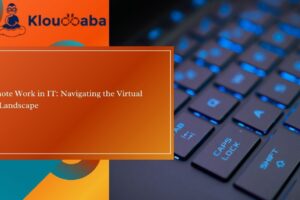
From Sales to Software: Non-IT Career Paths to IT Success
From Sales to Software: Non-IT Career Paths to IT Success- Welcome to our insightful exploration of “From Sales to Software: Non-IT Career Paths to IT Success.” In today’s rapidly evolving job market, the field of Information Technology (IT) offers an abundance of opportunities for professionals from diverse backgrounds to transition into rewarding and successful careers. This blog post delves into the journey of individuals who have navigated non-IT career paths and successfully transitioned into thriving roles within the IT industry. Let’s explore how transferable skills, diverse experiences, and a passion for technology can pave the way for success in IT, regardless of one’s previous career trajectory.
Also Check: Resume Revamp: Tailoring Your CV for IT Job Applications
The Growing Demand for Diverse Skill Sets in IT
The field of Information Technology (IT) is experiencing a transformation, with an increasing recognition of the value that professionals from non-IT backgrounds bring to the industry. Let’s delve into why diverse skill sets are in high demand in IT:
- Evolving Industry Landscape:
- The IT industry is evolving rapidly, driven by technological advancements, digital transformation, and changing consumer needs.
- As organizations adapt to these changes, there is a growing demand for professionals with diverse skill sets and perspectives to drive innovation and problem-solving.
- Transferable Skills from Non-IT Fields:
- Professionals from non-IT fields, such as sales, marketing, finance, and operations, possess valuable transferable skills that are highly relevant in IT roles.
- Skills such as communication, problem-solving, project management, and customer service are essential in IT for collaborating with teams, understanding client needs, and delivering effective solutions.
- Value of Diversity and Inclusion:
- Embracing diversity and inclusion is not just a moral imperative but also a strategic advantage for organizations in the IT sector.
- Diverse teams bring a variety of perspectives, experiences, and approaches to problem-solving, leading to more creative solutions and better outcomes for businesses.
- Addressing Skills Gaps and Talent Shortages:
- The IT industry is facing skills gaps and talent shortages in key areas such as cybersecurity, data science, cloud computing, and artificial intelligence.
- By tapping into talent pools from non-IT backgrounds, organizations can bridge these gaps and cultivate a diverse workforce with the skills needed to address current and future challenges.
- Driving Innovation and Competitive Advantage:
- Embracing professionals from non-traditional backgrounds fosters a culture of innovation and adaptability within IT organizations.
- Different perspectives and approaches to problem-solving can spark creativity, drive new ideas, and give companies a competitive edge in the market.
By recognizing the value of diverse skill sets and experiences, the IT industry is opening doors to professionals from non-IT backgrounds, creating opportunities for individuals to thrive and succeed in technology-driven roles.
Recognizing Transferable Skills and Experience
In transitioning from non-IT careers to successful roles in Information Technology (IT), professionals can leverage their existing skills and experiences to make a valuable contribution to the industry. Let’s explore key transferable skills and experiences:
- Communication Skills:
- Effective communication is essential in IT roles for conveying technical information, collaborating with team members, and liaising with clients or stakeholders.
- Professionals from non-IT backgrounds often excel in communication, whether in written, verbal, or interpersonal forms, making them valuable assets in IT teams.
- Problem-Solving Abilities:
- Problem-solving skills are highly sought-after in IT for troubleshooting technical issues, identifying solutions to complex problems, and optimizing processes.
- Individuals with experience in roles that require problem-solving, such as sales, management, or customer service, possess transferable skills that are applicable in IT environments.
- Project Management Expertise:
- Project management skills are crucial for planning, organizing, and executing IT projects effectively within budget and timeline constraints.
- Professionals with experience in project management or leadership roles outside of IT bring valuable insights into project planning, resource allocation, risk management, and stakeholder coordination.
- Customer Service Orientation:
- Customer service skills play a vital role in IT roles that involve interacting with end-users, clients, or internal stakeholders.
- Professionals with backgrounds in sales, marketing, or service-oriented roles understand the importance of customer satisfaction, empathy, and responsiveness, enhancing the quality of IT services and support.
- Analytical Thinking:
- Analytical thinking is essential in IT for analyzing data, identifying trends, and making informed decisions to drive business outcomes.
- Individuals with experience in analytical roles, such as finance, research, or operations, possess transferable skills in data analysis, critical thinking, and problem-solving that are valuable in IT roles.
By recognizing and leveraging their transferable skills and experiences, professionals from non-IT backgrounds can position themselves for success in the dynamic and evolving field of Information Technology.
Also Check: Industry Insights: Hot Trends in IT Job Opportunities
Navigating the Transition: Strategies and Considerations
Transitioning from non-IT careers to successful roles in Information Technology (IT) requires careful planning, strategic thinking, and a proactive approach. Let’s explore effective strategies and considerations for navigating this transition:
- Assess Career Goals and Interests:
- Reflect on your career goals, interests, and motivations for pursuing a career in IT.
- Identify specific areas of IT that align with your skills, passions, and long-term aspirations, such as software development, cybersecurity, data analytics, or project management.
- Identify Transferable Skills and Knowledge:
- Evaluate your existing skills, knowledge, and experiences gained from your non-IT career.
- Identify transferable skills and competencies that are relevant and applicable to IT roles, such as problem-solving, communication, project management, and analytical thinking.
- Gain Relevant Experience and Training:
- Gain hands-on experience and technical skills through self-study, online courses, bootcamps, or workshops.
- Explore opportunities for internships, volunteer work, or part-time roles in IT-related projects to gain practical experience and exposure to industry tools and technologies.
- Networking and Professional Development:
- Build a strong professional network within the IT industry by attending networking events, joining online communities, and connecting with industry professionals.
- Seek mentorship and guidance from experienced IT professionals who can provide insights, advice, and support in navigating your career transition.
- Update Your Resume and Online Presence:
- Tailor your resume to highlight relevant skills, experiences, and achievements that demonstrate your suitability for IT roles.
- Create or update your LinkedIn profile and other online professional profiles to showcase your interest in transitioning to IT and your commitment to continuous learning and professional development.
- Stay Resilient and Persistent:
- Understand that transitioning to a new career path, especially in a dynamic field like IT, may come with challenges and setbacks.
- Stay resilient, persistent, and proactive in pursuing your goals, and remain open to learning, adapting, and seizing opportunities for growth and advancement.
By strategically navigating the transition from non-IT careers to successful roles in IT, individuals can leverage their unique skills, experiences, and passions to thrive and succeed in the technology-driven landscape.
Navigating the Transition: Strategies and Considerations
Transitioning from a non-IT career to a successful role in Information Technology (IT) requires careful planning, strategic preparation, and a willingness to embrace new challenges. Let’s explore key strategies and considerations for navigating this transition:
- Assessing Career Goals and Interests:
- Start by evaluating your career goals, interests, and motivations for pursuing a career in IT.
- Identify specific IT roles or domains that align with your skills, passions, and long-term objectives, considering factors such as job outlook, salary potential, and growth opportunities.
- Identifying Transferable Skills and Knowledge:
- Take inventory of your transferable skills, experiences, and knowledge acquired from your non-IT career.
- Highlight relevant skills such as communication, problem-solving, project management, and analytical thinking that are applicable in IT roles and can differentiate you as a candidate.
- Gaining Relevant Experience and Education:
- Gain hands-on experience and knowledge in IT through self-study, online courses, bootcamps, or formal education programs.
- Consider pursuing certifications, attending workshops, or participating in internship programs to build technical skills, expand your network, and enhance your credibility in the IT field.
- Networking Within the IT Community:
- Network with professionals within the IT industry through online forums, social media platforms, industry events, and local meetups.
- Engage in conversations, seek advice from experienced professionals, and leverage networking opportunities to learn about job openings, trends, and best practices in IT.
- Seeking Mentorship and Guidance:
- Find mentors or advisors who have successfully transitioned from non-IT careers to IT roles and can provide guidance and support.
- Seek mentorship from individuals who can offer insights, share their experiences, and provide valuable feedback on your career development journey.
- Remaining Adaptable and Resilient:
- Embrace uncertainty and setbacks as natural parts of the transition process and remain adaptable and resilient in the face of challenges.
- Stay committed to your goals, continuously learn and grow, and be open to exploring new opportunities and career paths within the vast landscape of Information Technology.
By strategically navigating the transition from a non-IT career to the IT industry, individuals can position themselves for success and unlock new opportunities for professional growth and fulfillment.
Also Check: Building a Portfolio: Showcasing Your Skills in the IT Job Market
Success Stories: Real-Life Examples of Non-IT Professionals Thriving in IT
Real-life success stories serve as inspiring examples of how individuals from non-IT backgrounds have successfully transitioned into thriving roles within the Information Technology (IT) industry. Let’s explore some of these remarkable journeys:
- From Sales to Software Development:
- Jane, a former sales executive, decided to pursue her passion for coding and enrolled in a coding bootcamp.
- Leveraging her strong communication skills and sales experience, Jane excelled in software development and secured a junior developer position at a tech startup.
- Marketing to Digital Marketing Specialist:
- Michael, a marketing manager with expertise in digital marketing strategies, recognized the growing demand for digital skills in the IT sector.
- He obtained relevant certifications in SEO, SEM, and social media marketing, positioning himself as a valuable asset to companies seeking to enhance their online presence and digital marketing efforts.
- Finance to Data Analytics:
- Sarah, a finance professional with a knack for numbers and analytics, transitioned into a career in data analytics.
- She acquired skills in data visualization, statistical analysis, and programming languages such as Python and SQL, landing a role as a data analyst at a leading technology company.
- Operations Management to Project Management:
- David, a seasoned operations manager, recognized his aptitude for project management and problem-solving.
- He obtained project management certifications such as PMP and Agile, leveraging his operational expertise to successfully lead IT projects and initiatives within his organization.
- Customer Service to IT Support:
- Emily, with a background in customer service and technical support, made a seamless transition into an IT support role.
- Her experience in troubleshooting customer issues and providing exceptional service translated well into resolving technical issues and supporting end-users in a corporate IT environment.
- Entrepreneurship to Tech Startup Founder:
- Alex, an entrepreneur with a passion for technology, founded a tech startup after identifying a market need for innovative solutions.
- Drawing upon his business acumen and leadership skills, Alex built a successful tech company, leading a team of developers and engineers to develop cutting-edge products and services.
These success stories highlight the diverse pathways and opportunities available for individuals from non-IT backgrounds to thrive in the dynamic and innovative world of Information Technology. By leveraging their unique skills, experiences, and passions, they have not only achieved personal and professional fulfillment but also made valuable contributions to the IT industry.
Embracing Diversity and Inclusion in IT
As we celebrate the success stories of individuals from non-IT backgrounds thriving in Information Technology (IT), it’s essential to recognize the importance of diversity and inclusion within the industry. Let’s explore how embracing diversity contributes to innovation, creativity, and success in IT:
- Diverse Perspectives Drive Innovation:
- Embracing diversity fosters an environment where individuals from varied backgrounds bring unique perspectives, ideas, and approaches to problem-solving.
- By integrating diverse viewpoints, IT teams can innovate more effectively, anticipate market needs, and develop solutions that resonate with diverse user demographics.
- Inclusive Cultures Foster Collaboration:
- Inclusive cultures promote collaboration, trust, and mutual respect among team members, leading to higher levels of engagement, productivity, and job satisfaction.
- Creating a culture of inclusivity encourages open communication, teamwork, and idea-sharing, ultimately driving collective success and achievement of organizational goals.
- Representation Matters:
- Representation matters in the IT industry, as diverse representation within organizations reflects the diverse communities they serve.
- Encouraging diversity in leadership positions, hiring practices, and employee resource groups not only enhances workplace diversity but also inspires future generations of IT professionals from underrepresented backgrounds.
- Enhancing Problem-Solving Capabilities:
- Diverse teams possess a broader range of skills, experiences, and cultural insights, enabling them to tackle complex problems from multiple angles.
- By harnessing the collective intelligence of diverse teams, organizations can develop innovative solutions that address the evolving needs of customers and stakeholders.
- Building Inclusive Workforce Development Programs:
- Investing in inclusive workforce development programs, mentorship initiatives, and diversity training workshops can cultivate a pipeline of diverse talent in the IT industry.
- Providing equal access to educational resources, career advancement opportunities, and professional development programs empowers individuals from all backgrounds to succeed and thrive in IT careers.
- Driving Social and Economic Impact:
- Embracing diversity and inclusion in IT not only drives business success but also contributes to broader social and economic impact.
- By creating equitable opportunities for all individuals to participate and excel in the IT workforce, organizations can help bridge socioeconomic disparities and drive positive change in communities worldwide.
By embracing diversity and inclusion in IT, organizations can unlock the full potential of their workforce, drive innovation, and create a more inclusive and equitable future for the industry.
Conclusion: From Sales to Software- Non-IT Career Paths to IT Success
In conclusion, “From Sales to Software: Non-IT Career Paths to IT Success” has shed light on the diverse pathways available for individuals from non-traditional backgrounds to thrive in the dynamic field of Information Technology (IT). Let’s recap key insights and takeaways:
- Diverse Talent Fuels Innovation:
- Embracing professionals from non-IT backgrounds brings diverse perspectives, skills, and experiences to the IT industry, driving innovation and creativity.
- Transferable Skills Are Valuable Assets:
- Transferable skills acquired in non-IT careers, such as communication, problem-solving, and project management, are highly valued in IT roles and can differentiate candidates in the job market.
- Strategic Navigation Is Key:
- Navigating the transition from a non-IT career to IT success requires strategic planning, continuous learning, networking, and a willingness to adapt to new challenges.
- Success Stories Inspire and Motivate:
- Real-life success stories of individuals who have successfully transitioned into IT roles serve as inspiring examples and demonstrate the possibilities available to those willing to pursue a career in technology.
- Diversity and Inclusion Drive Industry Growth:
- Embracing diversity and inclusion within the IT industry not only fosters a culture of innovation and collaboration but also contributes to social and economic impact, driving positive change in communities worldwide.
- Opportunities Abound for All:
- Regardless of one’s background or previous career trajectory, opportunities abound for individuals to embark on fulfilling and rewarding careers in IT, leveraging their unique skills, passions, and aspirations.
As we celebrate the success stories and pathways to IT success beyond traditional routes, let us continue to champion diversity, inclusion, and equitable opportunities within the IT industry. Together, we can create a more vibrant, innovative, and inclusive future for the world of technology.
Thank you for joining us on this insightful journey of exploration and discovery. We hope that you feel inspired and empowered to pursue your own path to success in Information Technology.




